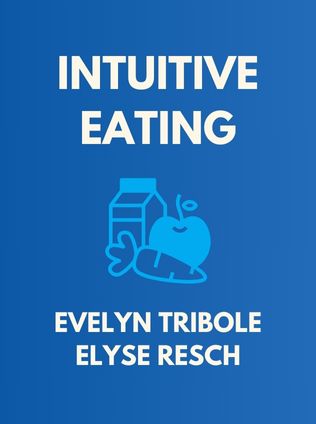
Intuitive Eating
A Revolutionary Program That Works
By Evelyn Tribole and Elyse Resch
Published 05/1995
About the Author
Evelyn Tribole and Elyse Resch, the brilliant minds behind Intuitive Eating, have left an indelible mark on the world of nutrition and wellness. Evelyn Tribole, a registered dietitian and bestselling author, has built a career on helping individuals break free from the harmful effects of diet culture. Her compassionate approach emphasizes the importance of listening to one’s body and rejecting the external pressures that dictate how we should eat.
Elyse Resch, a nutrition therapist with a specialization in eating disorders, brings decades of experience in helping people develop healthier relationships with food. Together, these two authors have created a guide that encourages readers to embrace a balanced and fulfilling relationship with food, one that is rooted in self-respect and self-awareness.
Since its first publication in 1995, Intuitive Eating has evolved with each edition, incorporating new research and insights. Now in its fourth edition, this book remains a cornerstone for those seeking to break free from the damaging effects of dieting and to cultivate a more harmonious relationship with food.
Main Idea
The central tenet of Intuitive Eating is the radical notion that we can heal our relationship with food by turning inward and listening to our bodies. Diet culture, which is pervasive in Western society, promotes the idea that happiness and health are only attainable through strict control over what we eat. This mindset often leads to physical and emotional harm. Tribole and Resch argue that by rejecting the external pressures to conform to a certain body ideal and instead trusting our bodies to guide us, we can achieve true health and happiness.
The book is divided into two main parts: The first part delves into how diets damage our relationship with food, leading to negative consequences such as harmful body image, weight gain, and self-judgment. The second part offers a path forward, advocating for an approach to eating that is based on internal cues, self-compassion, and a rejection of diet culture.
Table of Contents
- Part 1: How Diets Damage Your Relationship With Food
- Negative Consequence #1: Diets Perpetuate a Harmful Body Image
- Negative Consequence #2: Diets Increase the Risk of Weight Gain
- Negative Consequence #3: Diets Trigger Self-Judgment and Self-Blame
- Negative Consequence #4: Diets Disrupt Bodily Awareness and Nutritional Needs
- Part 2: Promote Food Harmony by Tuning Into Your Body’s Needs
- Tip #1: Reject Diets and Accept Your Unique Body
- Tip #2: Listen to Your Body’s Hunger and Fullness Cues
- Tip #3: Prioritize Food Satisfaction Over Food Morality
- Tip #4: Find Joy in Moving Your Body
- Conclusion: Embrace Intuitive Eating for a Healthier Life
Part 1: How Diets Damage Your Relationship With Food
The first part of Intuitive Eating serves as a powerful indictment of diet culture and the myriad ways it harms individuals. Dieting is often portrayed as a virtuous path to health and happiness, but as Tribole and Resch point out, it frequently leads to the opposite. The authors identify four major consequences of dieting: it perpetuates harmful body image beliefs, increases the risk of weight gain, triggers self-judgment and self-blame, and disrupts our ability to listen to our body’s natural cues.
Negative Consequence #1: Diets Perpetuate a Harmful Body Image
One of the most damaging effects of dieting is the way it warps our perception of our bodies. In Western societies, there is an overwhelming emphasis on thinness as the ideal standard of beauty and health. This emphasis is perpetuated by media, advertising, and social networks, all of which bombard us with images and messages that equate thinness with worth.
Tribole and Resch argue that this constant exposure to weight control advice and idealized body images can lead to a distorted view of our own bodies. We may begin to believe that our worth is tied to our ability to conform to these narrow standards, leading to harmful beliefs about our bodies. As the authors explain, "This pressure may have led you to develop harmful beliefs that prioritize how you look at the expense of your overall well-being."
Sign up for FREE and get access to 1,400+ books summaries.
You May Also Like
The Subtle Art of Not Giving a F*ck
A Counterintuitive Approach to Living a Good Life
By Mark MansonRich Dad Poor Dad
What the Rich Teach Their Kids About Money - That the Poor and Middle Class Do Not!
By Robert T. KiyosakiHow To Win Friends and Influence People
The All-Time Classic Manual Of People Skills
By Dale CarnegieFreakonomics
A Rogue Economist Explores the Hidden Side of Everything
By Steven D. Levitt and Stephen J. Dubner



















